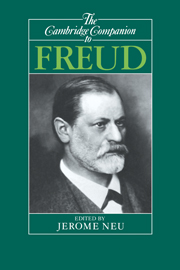Book contents
- Frontmatter
- Introduction
- 1 Freud: The psychoarcheology of civilizations
- 2 Seduced and abandoned: The rise and fall of Freud's seduction theory
- 3 Freud's androids
- 4 The interpretation of dreams
- 5 The unconscious
- 6 The development and vicissitudes of Freud's ideas on the Oedipus complex
- 7 Freud and perversion
- 8 Morality and the internalized other
- 9 Freud on women
- 10 Freud and the understanding of art
- 11 Freud's anthropology A reading of the “cultural books”
- 12 Freud's later theory of civilization
- 13 In fairness to Freud: A critical notice of The Foundations of Psychoanalysis, by Adolf Grünbaum
- Bibliography
- Cited works of Freud
- Index
- Series list
8 - Morality and the internalized other
Published online by Cambridge University Press: 28 May 2006
- Frontmatter
- Introduction
- 1 Freud: The psychoarcheology of civilizations
- 2 Seduced and abandoned: The rise and fall of Freud's seduction theory
- 3 Freud's androids
- 4 The interpretation of dreams
- 5 The unconscious
- 6 The development and vicissitudes of Freud's ideas on the Oedipus complex
- 7 Freud and perversion
- 8 Morality and the internalized other
- 9 Freud on women
- 10 Freud and the understanding of art
- 11 Freud's anthropology A reading of the “cultural books”
- 12 Freud's later theory of civilization
- 13 In fairness to Freud: A critical notice of The Foundations of Psychoanalysis, by Adolf Grünbaum
- Bibliography
- Cited works of Freud
- Index
- Series list
Summary
Often, when Freud mentioned morality, he was referring to a culture's restrictions on sexual behavior - a code regularly endorsed yet routinely defied. He was deeply interested in exposing the reasons for such restrictive sexual codes, and the dynamics of our deviations from them. Still, for Freud, it is not the sexual content nor the societal enforcement of certain constraints that makes them moral; moral constraints are, rather, constraints that play a particular role within the psychology of individuals - namely, the role of “superego.” While the emergence of a superego is, according to Freud, bound up with the dynamics of sexual desire in general and the oedipal complex in particular, in the end it is the relational properties and not the content of the superego - specifically, its historical relations to other people and its ongoing relations to the ego - that make it a superego and make it the agency of morality. An account of the formation and the character of the superego is, then, simultaneously an account of the formation and the character of morality.
To understand Freud's account of the superego, and the closely related ego-ideal, we must understand how a self or an ego is constituted and how characteristics of other people may be internalized to become parts of oneself. This story forms the crucial metapsychological background for Freud's account of morality, and I offer a somewhat novel interpretation of this background in the first and second sections of this chapter.
- Type
- Chapter
- Information
- The Cambridge Companion to Freud , pp. 209 - 223Publisher: Cambridge University PressPrint publication year: 1991
- 4
- Cited by



